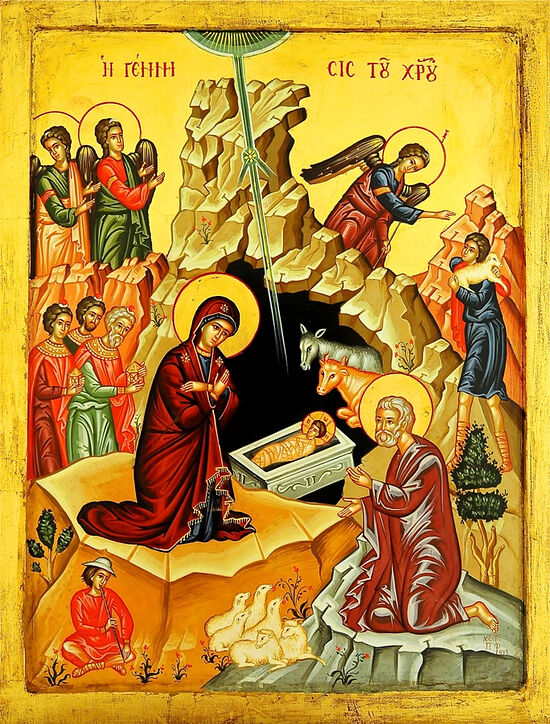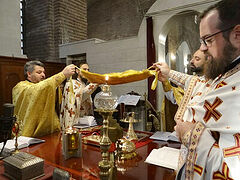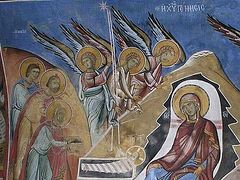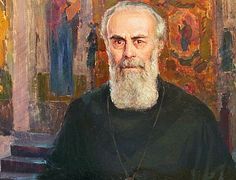To the Clergy, Monastics, and Faithful of the Orthodox Church in America,
My Beloved Children in the Lord,
Christ is born! Glorify him!
‘But when Herod died, behold, an angel of the Lord appeared in a dream to Joseph in Egypt, saying, “Rise, take the Child and his Mother, and go to the land of Israel…”’ (Mt. 2:19-20)
The protagonist, so to speak, for the first two chapters of Saint Matthew’s Gospel is the humble and silent man whom we call the Righteous Joseph the Betrothed.
Joseph is called ‘just,’ that is, he walked according to the commandments of God (Mt. 1:19). And, according to the scriptures, in keeping the commandments, a man may learn true knowledge. As the Psalmist says, ‘Teach me good judgment and knowledge: for I have believed thy commandments’ (Ps. 118:66).
We find that this is exceptionally true in the case of Saint Joseph. So just, so righteous, was he, that he was worthy to be taught and led by an angel. In an event that is sometimes called the annunciation to Saint Joseph, an angel comes to the righteous man in his moment of doubt concerning the pregnancy of his betrothed, telling him not fear.
And this exhortation not to be afraid is no mere formality, for the next words of the angel disclose a dread and fearful task. The angel asks Joseph to serve the most holy Theotokos and Ever-virgin Mary in place of an earthly husband (‘take Mary your wife’), and to minister to the Lord Jesus Christ in the place of an earthly father (‘you shall call his name Jesus’).
This alone—the command to serve as a foster father to the God of all and as a guardian for the Mother of the Light—would be fearful enough. But soon Saint Joseph and the holy Mother and Child for whom he is obliged to care are beset by extraordinary circumstances: a murder plot, an es-cape to a distant land, and a sojourn in that foreign country. We can only assume that, in Egypt, among strangers, away from home and property, the responsibility to provide for his supposed wife and son weighed very heavily upon this righteous man.
But again, the words of an angel, and this time these are words of relief and joy: ‘Go the land of Israel.’ Return home to your kin; return home to your property; return home to your people and your customs and your land.
The first time an angel visited the righteous Joseph, he brought a dread order from the Almighty, an order that would have to be carried out under the most trying of circumstances. The second time an angel came, he brought a welcome reprieve.
But in both cases, the just man Joseph was equally obedient to the divine will. When he was commanded to care for Mother and Child, he took up the task without hesitation, no matter what difficulties ensued. And when he was told to return to Israel, he went just as readily.
The same paradoxical way that Saint Joseph protected and cared for the omnipotent Master who holds all creation in the palm of his hand, God has given to us, Orthodox Christians, a special charge of sacred stewardship. God needs nothing from us, and yet he delights in allowing us to cooperate with him in the work of preaching the Gospel and sanctifying the world.
We might say that, just like the Righteous Joseph the Betrothed, we are, by divine grace, charged with caring for the newborn Christ. For what is the Church but Christ’s Body, growing in this world in wisdom and stature until it reaches the measure of the stature of the fullness in the age to come (Lk. 2:52, Eph. 4:13)? And we all share a responsibility, according to our station in life, to care for the Church through prayer, financial support, sacramental participation, and sharing and teaching the faith.
And then, on another level, we are each charged to care for Christ in our life, in our own heart. Saint Paul wrote to the Galatians that he was in travail until Christ be formed in them (Gal. 4:19). Each of us is called to reveal Christ in our life, to become a saint, to become Christ by grace. Through baptism and the Eucharist we have all received Jesus Christ within ourselves, as it were as a new-born Child. By prayer, careful practice of the virtues, attentiveness to our thoughts, and the cultivation of authentic love for God and man, we allow Christ to grow in us, until, we pray, it is no longer we who live, but Christ who lives in us (Gal. 2:20).
Today, celebrating the Nativity of the Savior in the flesh, may we all take Saint Joseph as our example as we seek to foster Christ in the Church and in our own hearts. Let us practice the commandments, discern the will of God, and do his will, even when the circumstances are difficult.
Truly, this world is an Egypt, and caring for Christ and his Church as Saint Joseph did always involves obstacles and challenges. But if we sojourn with the Christ-child in Egypt, faithfully attending to him in our lives and our communities, we can be assured that we, like Saint Joseph, will one day hear those welcome words: ‘Go to the land of Israel’—that is, come, ye righteous, and enter the heavenly mansions the Father has prepared for you from before all ages (Mt. 25:34).
By caring for our infant Savior and Lord in this way, we show our willingness to cooperate with the grace of God, God who so desired to have us as his fellow-workers, his brethren, and his friends that he deigned to be born in a cave and laid in a manger, on a cold night ‘while gentle silence enveloped all things, and night in its swift course was now half gone’ (Wis. 18:14). To him, our newborn God and Lord, be all glory, honor, and adoration, together with his eternal Father and his most holy, good, and life- giving Spirit.
With the blessing of the newborn Messiah, who is Lord and God before the ages, I remain sincerely yours in Christ,
+ Tikhon
Archbishop of Washington
Metropolitan of All America and Canada





